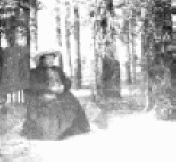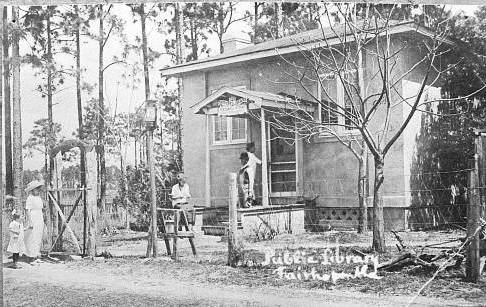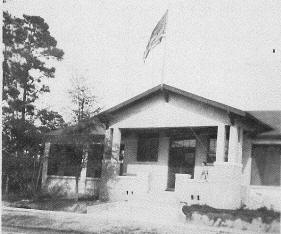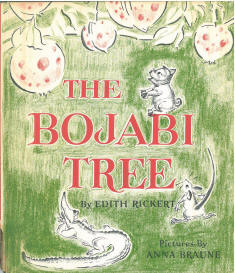ONE OF THE FIRST PRIORITIES – A LIBRARY
Click on a toggle section to learn more
Ernest B. Gaston (1861-1937) once said that Fairhope and the Single Tax Colony had essentially been a poor man’s effort. Gaston was referring to physical or material wealth. The fact cannot be denied that the community of Fairhope from the very beginning attracted individuals of the highest intellectual and spiritual wealth and character. Fairhope has fostered an atmosphere of idealistic equality and democracy which, let us hope, will always be one of Fairhope’s charms.
Less than six months after the first pioneer Single Tax families began grubbing out homesteads from the harsh environment on the Fairhope site, a Single Tax friend, George B. Lang of Seneca, Missouri, donated a collection of books for the “Fairhope Free Library.” This basic library material brought pleasure and relaxation to the hardy settlers after days of toil and during rainy periods when work outside was not possible.
We can be very proud that our little town has had access from the very beginning to a collection of books and other reading material to keep its citizenry informed. The Single Tax Colony envisioned the formation of a public library in Fairhope even before they came to “Stapleton’s Pasture” on the Eastern Shore of Mobile Bay.
Intellectual and progressive-minded men and women were attracted to the Howlands. Among the many forward-thinking visitors was Albert K. Owen. Desiring to demonstrate the feasibility of his financial theories coupled to community living, Owen developed elaborate plans for establishing a self-help community in Mexico at Topolobampo, Sinaloa. The Howlands sold their pleasant farm home in New Jersey and joined his group.
Having heard of a “Single Tax Colony” based on the theories of Henry George and newly established at Fairhope on the Eastern Shore of Mobile Bay, Alabama, Marie Howland investigated. She inquired by mail to her friends in the United States as well as by correspondence with the fledgling colony at Fairhope. As a result in 1899, she came to the embryonic village of Fairhope to make her future home.

Marie Howland’s experience with newspaper reporting, both in New York and the Topolobampo, Mexico colony, made her a useful editorial assistant to Earnest B. Gaston, a prime mover in the founding of the Fairhope Single Tax Colony and editor of the world-wide circulated newspaper, The Fairhope Courier. Marie Howland contributed “open letters” to the Courier, addressed to friends throughout the world, telling of her own life and times and Single Tax experiences in this new town of Fairhope, Alabama.
The collection of books in the embryonic Fairhope Public Library continued to increase in number and quality and the fledgling Library Association began to concern itself with plans for more commodious quarters. Mr. Joseph Fels, a wealthy soap manufacturer and long-time friend of Fairhope Single Taxers, had previously given one thousand dollars toward a library building. However, since the hurricane of 1906 had destroyed the school building , the gift was used temporarily to provide facilities for a school, and the library plans were held in abeyance.

Marie Howland continued as librarian for another nine years. She was assisted by many eager and willing school children who loved working with books and with the library lady who was always so cheerful and laughed so easily. As her health began to fail, Mrs. Howland was unable to keep the new library open as much as she wished, but with limited funds and volunteer assistance, she managed to open at least two days a week.
As a tribute to Mrs. Howland when she died in 1921, the simple funeral service was held in the library building that had for so long been the object of her care and affection. Ernest B. Gaston and the Reverend George W. Wood conducted the service, and her body was laid to rest in the Colony cemetery located at the corner of Section and Oak Streets.
Mrs. Lydia Comings succeeded Mrs. Howland as librarian in 1917. Mrs. Comings pioneered many of Fairhope’s initial cultural advances and served as president of the original Library Association. She maintained enthusiasm and public interest among Fairhope’s citizens toward the upkeep and advancement of the library. She gave up the position as Librarian in 1921 but continued to serve as president of the Library Association until 1941.

About 1933 the government Works Progress Administration (WPA) subsidized a work program that considerably benefited our local library. All available space was given over to a group of women engaged in rebinding and lettering books and other activities necessary for library maintenance. The WPA project was still in motion when Mrs. Mershon became librarian in 1934. Her assistant, Miss Mary Bishop, was appointed to manage and direct the Project until 1942, when the government discontinued these projects. In 1946 Miss Bishop took over the duties of librarian with Miss Ruth Jeffcott as her capable assistant. When Miss Bishop relinquished her duties, it was necessary to bring Mrs. Lee from retirement to again direct the library, and Miss Jeffcott continued as her assistant.
During Miss Braune’s tenure the Fairhope Single Tax Corporation approved and paid for the addition of a much needed large room for the library. In addition, natural gas was installed and new electrical lighting added. Then both the interior and exterior were renovated and repainted, and the entire building was re-roofed.

One of the outstanding services the library offers is its weekly book review. During Mrs. Carr’s directorship, an interested group began to meet in the library’s lobby to discuss literary matters, and thus the Tuesday Book Reviews evolved. They have continued by popular demand.
In 1972, however, it was determined that the “Friends” could be even more effective by amending the Constitution so that donors might have the privilege of writing-off financial contributions to the non-profit organization. With the approval of the Internal Revenue Service, donations to the organization became tax deductible.
The Friends of the Fairhope Public Library have proven to be friends indeed. Their many activities have culminated in substantial financial gains for the library, making available numerous physical assets. They have also provided needed services, and their planned events have increased interest in library activities. The organization sponsors the weekly book reviews as well as the annual book sale. Since its inception, the accomplishments of this fine group of volunteers have been praised highly by each librarian.
The annual book sale was initiated during the tenure of Mrs. Frances Black (librarian from 1972 to 1977) when it was decided to cull some of the obsolete books on the overly-crowded shelved in the library. Patrons and friends added many of their personal books to the supply and eagerly came forward to assist in that first sale. This sale has become a successful event bringing in several thousand to the library.


